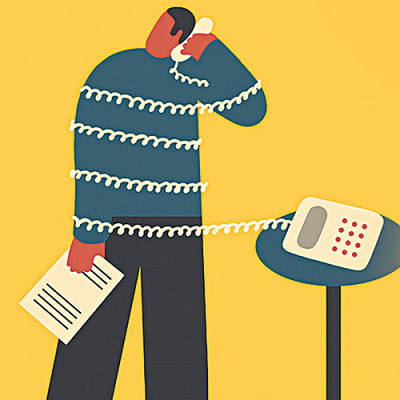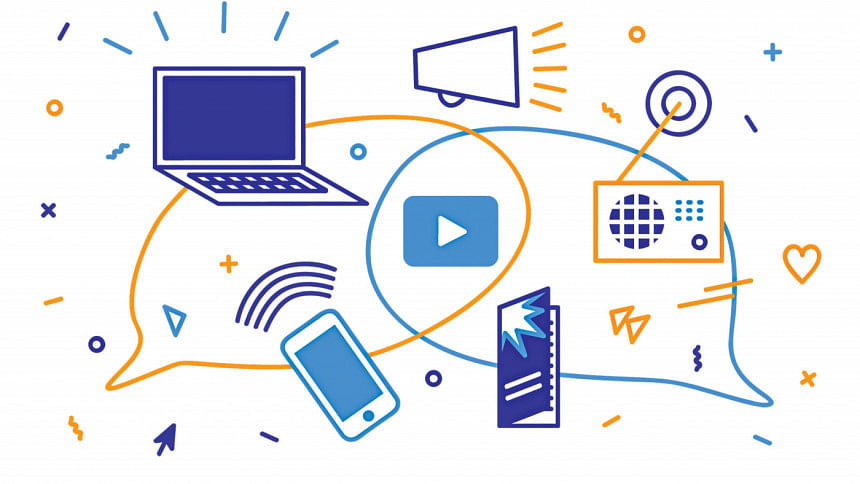A Crisis in Communication

Lately I have developed a new, albeit exasperating, habit. Every time I am in conversation with other people where anything about big gatherings and people-populated parties come up, my instant response is to say, "That's so 2019."
Although this is really just my 99th attempt at suave humour, it has recently led me to think deeper into the matter of public speaking and our emerging changes in communication. The year is almost (or so we're counting) at a close with many new norms of lifestyle firmly being established across the world. We have revamped our outlook on social gatherings, academic experiences, the ups and downs of productivity and even our own personal journeys. In the flux of staying cooped up and almost subconsciously making that rushed move to a new virtual reality right from our homes, it gives rise to the question: are our communication skills lagging behind?

Online courses were on the rise even during pre-pandemic times but this year alone has single-handedly brought about a massive demand on a global scale. In a way, the lockdown has actually provided people an opportunity to not only work from the leisure of their homes but also focus on their hobbies from a more professional lens. Career-oriented individuals have been able to develop their Microsoft Excel skills, coding, management and much more while others have utilised this chance to try out Adobe's tools on video and graphic design. Yet, courses on public speaking or communication-building idle silently on the sidelines, left alone by the majority of online learners.
A strong argument can naturally be made here that holding exemplary communication skills is not exactly a priority at this point in time. After all, with everything being online currently, from work meetings and job interviews to online classes and even weddings, who is even going to bother focusing on honing their public speaking skills right now? However, the damage of leaving behind something as crucial as communication-building can entail significant harm for us in the long term. This deceivingly small problem seems to be emerging already in both personal and professional rendezvous.
Earlier this week, I was discussing the potential issues that can appear from a lack of communication skills post-pandemic with my colleague. He agreed and shared his own experience on how, due to not having met his friends for such a long while, he could relate with this issue personally. My colleague shared his thoughts that despite being excited at the prospect of meeting his old friends, the actual meeting had felt very foreign. Simply hearing his friend speak face-to-face, or mask-to-mask in this case, after so many months of online communication, had somehow left him feeling more unsettled; the sound of a supposedly "new" human voice making him unsure to react in a casual manner.
The problem of dwindling public communication is even making its appearance at professional aspects. For recent graduates, the significant shift from being a student to entering the job market has been a completely virtual experience.
Subah Shaheen, a management trainee at Robi Axiata Limited, shares similar views. "For many of us entering the job market in spring, the first meetings and interactions we have had with colleagues have been virtual. While this does not affect the output of work per se, it really does make work feel more mechanical and that can lead to a faster burnout. You really can't put a measure on the power of human interaction. A few sentences of small talk with a teammate or running into your favourite colleague in the elevator can really feel rejuvenating," says Subah.
In the context of measuring human interaction, many individuals who have always managed to nail their office presentations with their excellent public speaking skills are now struggling to bring their previous influx of charisma and confidence from behind the virtual walls of a screen. Naturally, for many public speakers, reading the room as well as the body language of their audience is a crucial step in making and also breaking down their points correctly.
Furthermore, the issues of distorted static, dropped calls and an unsteady internet connection can in fact impose severe obstacles during online team assessments.

Zaid Karim*, a senior officer at a large NGO, recently took part in a renowned MNC's assessment round and felt the "virtual" pressure massively.
"I had to undertake various stages such as group discussions, role-play sessions and individual presentations virtually. Right after the group discussion, two of the candidates (including myself) were asked to leave the video call. The other candidate and I were left confused about the next step. Did we get eliminated already? I kept questioning whether I was still part of the assessment. Half an hour later, I got a call to do my next set of exercises. This experience made me realise how the shift from physical work spaces to online assessments has really made us overlook the importance of communication," Zaid explains.
The impact of minimal communication practices in the field of academics can also potentially lead to extremely strong setbacks. This complication goes up a notch for students studying in fields that require more practical usage than theoretical, in technical fields such as engineering, medical or architecture students.
Tasnia Noor, studying to become a doctor, explains the difficulties in experiencing the same flow of communication that normally takes place between medical students and patients in a virtual setting. She states, "We are looking at screens and learning case histories. But the truth is, no two patients are the same; learning this way will never be enough. We need to see the patients, in a way they are our teachers too."
Students who are preparing to apply abroad for higher studies will also now have a much harder time giving their verbal interviews and in maintaining a balanced and coherent conversation with their IELTS instructors. With the opportunities from workplaces, physical classes, and even social hangouts all basically coming to a standstill, it can become extremely difficult for aspiring students to excel their interviews and attain the scores that they need in their admission requirements.
Our resources to practice public speaking on a daily basis really diminished overnight due to the pandemic, and most of us did not even realise that it was slipping away. Although it can feel frustrating to identify the problem without a guaranteed solution in sight, there are always loopholes one can work around. If the issue is addressed, it can even become a blessing in disguise.
Mahbub Hossain, a senior associate at JPMorgan Chase & Co., admits the lockdown has actually helped many employees to come out of their comfort zones. He shares, "Many people are coming out of their shells due to being forced in becoming better communicators. Now, we need to be a lot more vocal and that is no longer just a choice."

One effective start can be to identify the merits of having exceptional soft skills, and therefore working on developing them just as much as our technical skills. A great platform to practice public speaking is YouTube, where one can find a wide variety of content to choose from and practice their communication skills alongside the on-screen tutor. Listening to TED Talks can also be extremely helpful, where one can pick up the styles and form of effective communication on public platforms. Subah, who recently completed an online course titled "Communication Strategies for a Virtual Age" under the University of Toronto, recommends bringing creativity into the learning process. "Maybe through doing live polls or questions on tools such as Mentimeter, we can make the sessions more interactive. Though it is a challenge, there is no end to creativity, given there is now an app or website for just about anything, if we really look for it," mentions Subah.
If none of the above suggestions reap any fruitful result, then the easiest recommendation is to try increasing your daily frequency of social communication with your colleagues, peers, friends, and family. Despite also taking place through a screen, regularly holding candid and free-flowing conversations can still build your confidence and prepare you better in being a well-rounded public speaker. There is no doubt that each phase of our lives will bring different changes requiring demands of different skills. However, the skill of effective communication will never go out of style.
Roshni spends her time dreaming about cakes and scenic waterfalls. Send her your thoughts at [email protected]

 For all latest news, follow The Daily Star's Google News channel.
For all latest news, follow The Daily Star's Google News channel. 



Comments